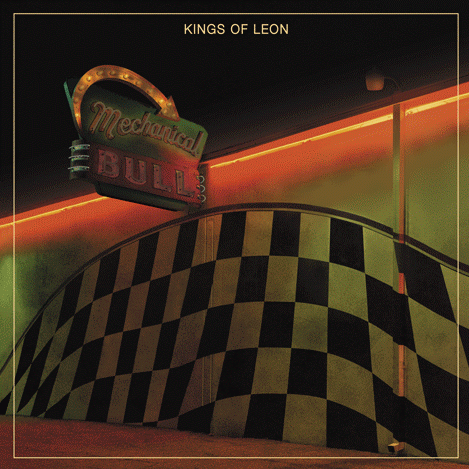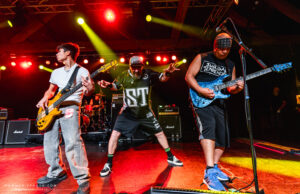New Music Preview: Mechanical Bulls**t by Kings of Leon
Over the last decade, Kings of Leon have released six albums and while I wasn’t there from the very beginning[1], since discovering Youth & Young Manhood a few years post it’s 2003 release, it’s held up as one of my favorite modern albums. The record captured the essence of sloppy southern rockers with a sense of urgency. But each KoL-Aid album since has could easily labeled as one of three specific categories. Youth and Aha Shake Heartbreak were the garage-roots Tennessee blues albums and by far their best records. Because of the Times and Only By The Night were their spotlight days as teen idol alt-rock stars, snuggling up to the Arctic Monkeys. Most recently, both Come Around Sundown and Mechanical Bull comprise the motion of the Followills taking their rightful seat between Aerosmith and Mötley Crüe at the Arena Rock dinner table where every meal is white, bland, and over-done.
Upon first listen of “Supersoaker”, and in reading Nathan Followill’s comment that Mechanical Bull would be more “like our earlier stuff,” one could imagine a whole album full of these California-esque summer rock anthems that would be the perfect soundtrack to 5 for $5 Corona Bucket Night at the local dive-bar. And then “Don’t Matter” ruined it. With its generically mainstream Guns ‘N Roses production and backup-vocals oddly reminiscent of Muse, you quickly realize that the days of the Kings of CCR[2] are over. Maybe Mechanical Bull really is a return to the earlier stuff. And maybe that earlier stuff is a whole secret catalog of albums that sound just like How to Dismantle an Atomic Bomb. Beyond the first few tracks, the rest of the album is just a page out of The Edge’s book[3]. There’s so much reverb on the guitars that you think you’re headed through a tunnel, those full and heavy drums so familiarized in their first two albums have been replaced by highly compressed and often inorganic fills. “Beautiful War” is an obvious example of the U2 comparison[4], with a chorus that could easily find itself a better home underneath Bono’s larynx[5] than being supported by Caleb’s rasping whine. “Temple” would make a great theme song to whatever the next CW teenage girl drama or Smallville spin-off is but somehow, I doubt that was really the motivation they had in the early phases of songwriting.
The rest of the album is unremarkable, with “Wait for Me” taking it’s anticlimactic place as the formulaic radio single among twenty minutes of “Use Somebody” knock-offs. However, with all of the personal drama surrounding the release of the album that stems from Caleb’s dramatic exit off-stage from a 2011 show and the band’s almost complete dissolution, there are moments within the last half of the record that I find intriguing. First, in the song “Family Tree”, the concept of the Followill’s singing to the values of biological ties and family secrets seems ironic given that the nature of their relationship could be described as tumultuous at best. It almost seems like taking parenting advice from Dina Lohan but maybe this contradiction is exactly why the band feels they are in such a comfortable position to discuss the importance of keeping the arguments among brothers a family matter. Additionally, the lyrics to “Comeback Story” – I walk a mile in your shoes. Now I’m a mile away and I’ve got your shoes – when drenched in melodic guitar and a soft string ensemble, are the kind of tongue-in-cheek romanticism that makes you question the sincerity of the band’s triumphant return entirely; it sounds nice and pleasant but at the core, there’s still an overbearing sense of cynicism.
My biggest problem with Mechanical Bull is still the comment that it sounds “like our earlier stuff.” To change your genre and move in a new direction is not an unusual course of action in the music community; they’d already proven this to be successful during their transition to alt-rock in the early 2000s. The problem I have with this progression is that to label your music as something it’s not is extremely misleading. When Herbie Hancock recorded “Rockit”, he wasn’t promising a return to early Bebop. For the Kings to dangle the promise of another Youth & Young Manhood before their loyal Southern Rock fans, myself included, is just setting the audience up to become overly critical and ultimately disappointed. However, I don’t think it will affect album sales in anyway. Even with all of its faults, Mechanical Bull is still significantly better than Come Around Sundown. But if they truly want to reinvent themselves, maybe they should follow the lead of Daft Punk and the early greats and make the jump into disco – but for the sake of my sanity, I pray they don’t. Who knows, maybe there’s just still too much pigeon-shit clogging up their earholes, but they’ve definitely lost that garage-blues edge that helped them to reach a position where it became possible to marry Victoria Secret models[6]. But in their defense, the final track “On the Chin” still does have a certain “southern” feel. …The Dixie Chicks counts as southern, right?
Rating: 5.5/10
Ian is the newest contributing writer at SMI. He currently studies English at UW and is both drummer and manager for the local band The Mama Rags.






0 comments